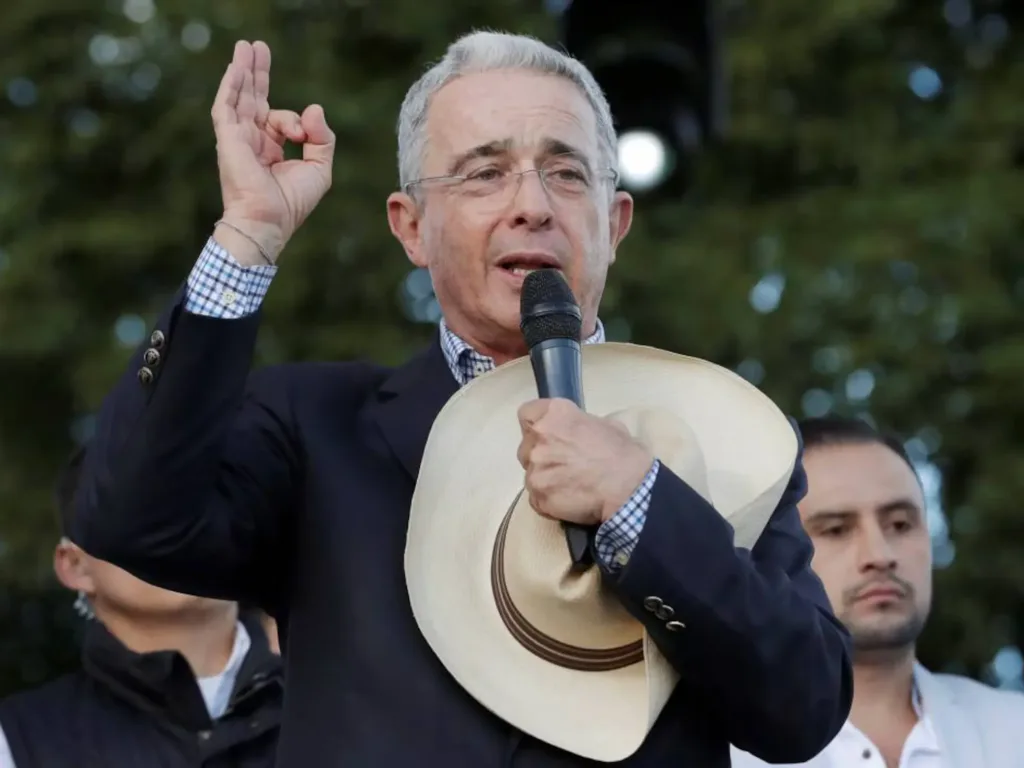
Álvaro Uribe, former president of Colombia, accused of ties to narco-trafficking and paramilitary groups. File photo.

Orinoco Tribune – News and opinion pieces about Venezuela and beyond
From Venezuela and made by Venezuelan Chavistas

Álvaro Uribe, former president of Colombia, accused of ties to narco-trafficking and paramilitary groups. File photo.
A declassified list from 1991, prepared by the US Defense Intelligence Agency (DIA), which was made public in 2004, contains the name of former Colombian President Álvaro Uribe Vélez (2002–2010) among 104 people linked to drug trafficking. In the document, prepared in the early ’90s, Uribe’s name appears at number 82, identified as a close collaborator of the infamous Medellín Cartel.
The DIA list, which also contains names of drug lords like Pablo Escobar (number 79) and Jhon Jairo Velásquez, alias “Popeye” (number 1), describes Uribe as a “close friend” of Escobar. Additionally, it mentions that, as a senator, Uribe allegedly participated in the drug trafficker’s campaign to reach Congress and worked against the extradition treaty between Colombia and the US.
This document has recently become a subject of debate and discussion in Colombia, particularly in light of Uribe’s political career, who became president of the nation 13 years after the creation of the document.
Álvaro Uribe has faced a series of allegations, from ties to paramilitary groups to accusations of witness tampering. One of the latest and high-profile cases against him concluded with a first-instance conviction on August 1. A criminal court in Bogotá sentenced him to 12 years in prison for the crimes of bribing witnesses in a criminal proceeding and procedural fraud. The sentence, which was a historic milestone as it was the first criminal conviction of a former Colombian president, originated from an investigation by the Supreme Court of Justice.
The accusations arose in 2012, when Senator Iván Cepeda, in a parliamentary session, spoke about Uribe’s ties to the paramilitary group Metro Bloc of the United Self-Defense Forces of Colombia (AUC). In response, Uribe accused Cepeda of alleged witness tampering. However, the Supreme Court dismissed the complaint against Cepeda and initiated an investigation against Uribe for the same accusations.
Uribe, as a “determiner,” instigated third parties to manipulate witnesses who were in prison, offering them benefits in exchange for false statements that would favor him. The evidence presented included more than 1,500 pages of documents and over 27,000 hours of phone recordings that demonstrated the contacts between Uribe’s emissaries and the witnesses.
In February this year, former paramilitary leader Juan Guillermo Monsalve declared in court that Álvaro Uribe was the creator of the paramilitary group Metro Bloc. Monsalve’s testimony, which became central in the case against Uribe, suggests that the organization was formed on the estate of the former president’s family, Guacharacas, in the state of Antioquia.
Álvaro Uribe’s family bought the estate in 1978. The estate, of about 2,000 hectares, was mainly dedicated to cattle ranching. The Uribes faced several problems with the property, and the first major conflict was a strike by 68 workers demanding payment of overdue wages.
Monsalve, son of the former steward of the estate, expressed in his testimony that both Álvaro Uribe and his brother Santiago played a fundamental role in the formation and growth of Metro Bloc. According to the testimony, the group was founded in the 1990s to protect the estate from guerrilla groups. However, over time, the group grew considerably, reaching around 1,500 members by the year 2000.
Colombia Court Orders Uribe to be Freed as He Appeals His Sentence for Bribery & Fraud
Monsalve also reported that he has been the victim of a “witch hunt” against him since he decided to cooperate with the justice system. The former paramilitary leader, who is currently serving a sentence for abduction, presented evidence of the pressure to which he was subjected to retract his statements.
In addition to the accusations of bribing witnesses and procedural fraud, Uribe has been the subject of other allegations and accusations, such as the “false positives” scandal — in which extrajudicial executions of civilians, mostly young people, were presented as guerrillas killed in combat.
He was also accused of ordering or allowing illegal surveillance of magistrates, journalists, and political opponents, including current President Gustavo Petro.
Although Uribe was acquitted in the cases of former Prosecutor Hilda Niño Farfán, accused of favoring paramilitaries, and former AUC member Harlinton Mosquera, he was convicted of bribery and procedural fraud and sentenced to prison. However, on Aug. 19, the Superior Court of Bogotá (TSB) revoked the immediate detention order and allowed Uribe to await the resolution of the appeal without going to jail, arguing a “violation of the rights to human dignity, due process, the presumption of innocence, and freedom.”
After this decision, Colombian Senator Iván Cepeda, a victim in the case against Uribe, expressed his respect for the ruling but did not agree with it. According to Cepeda, this measure is part of a strategy by Uribe to pressure the justice system and influence the final outcome of the process.
The senator stated that despite Uribe’s provisional release, the case is supported by concrete evidence and that he expects the court to rule in strict adherence to the law. He added that an appeal and other actions will follow in response to this decision.
(Telesur)
Translation: Orinoco Tribune
OT/SC/SH